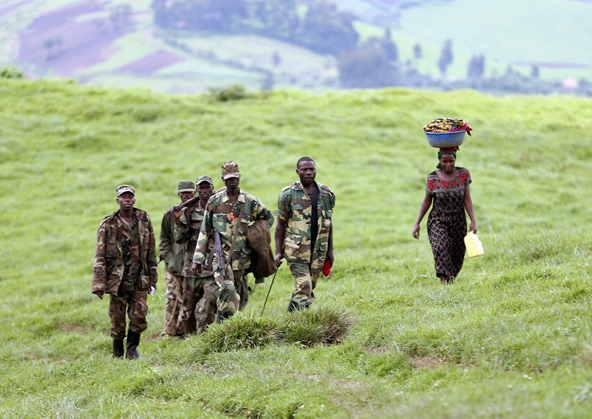
KINSHASA, Congo (CNS) — As Congolese rebels initiated what appeared to be a partial withdrawal from the city of Goma, a Catholic organization said the region’s civilians remained either on the run or terrified that their community would be the next target for a rebel attack.
“We abandoned our homes unable to bring food with us. We fled into the forest with only one objective in mind, our safety. And we don’t have any idea of when or how we will return home,” a Congolese identified by a pseudonym, Paluku, told Jesuit Refugee Service.
Paluku fled his home in Masisi, northwest of Goma, Nov. 25 following the outbreak of fighting between the Congolese army and an ethnic Mai-Mai militia group; he currently is in hiding.
“We don’t have anything to eat or drink. Above all, the women and children are in a state of shock. And we don’t have any idea of when we’ll finally have peace,” Paluku was quoted as saying. “Today we fled from the Mai-Mai militias; tomorrow it may be from M23.”
JRS has reported that the Mai-Mai rebels have aligned themselves with M23 rebels in eastern Congo. On Nov. 25, intense fighting with government troops forced JRS to suspend services in Masisi.
“When we heard gunfire, we witnessed the mass flight of the population of Masisi. In the beginning, many sought safety in the parish, then they began fleeing toward Nyabiondo. People had a look of fear in their eyes,” a staff member was quoted as saying on the JRS blog.
The current crisis provoked a declaration of “profound concern” and shock and indignation from presidents of African bishops’ conferences and presidents of African Caritas organizations, gathered at a Caritas Internationalis meeting in Kinshasa Nov. 22. The bishops called for respect of the whole Congolese national territory and for an end to the illegal exploitation of natural resources, citing this as “the main cause of this war.”
Humanitarian agency sources reported that since the M23 rebellion started last April — when ethnic Tutsi members rebelled against the Congolese army, backed by neighboring Rwanda — some 650,000 civilians have been forced to flee their homes. Congo’s bishops have called for an end to “balkanization” of the Congo, referring to interference from neighboring countries such as Rwanda and Uganda.
A coalition of Canadian nongovernmental organizations that work in Congo called for new strategies in the country, citing the boldness of rebels and the failure of the army to restore order. Included in the coalition were the Canadian Catholic Organization for Development and Peace; l’Entraide Missionnaire, a group founded by Catholic missionaries; Carrefour Foi et Spiritualite Bordeaux-Cartierville, a Catholic resource center; the ecumenical organization Kairos; and the United Church of Canada.
The coalition said that, given the U.N.-documented meddling of Rwanda and Uganda in the crisis, Canada should review its bilateral relations with these countries and impose sanctions against these governments for their support of this movement. The organizations also called on Canada to demand a cease-fire and respect for humanitarian law from all parties and to deliver humanitarian assistance to the displaced.
A representative of Development and Peace, Serge Blais, interviewed on Radio Canada Nov. 25, said that the current situation is a result of policies that were at best misguided in the integration of former rebels into the Congolese army and the failure to try to bring to justice war criminals. The ethnic Tutsis who currently make up the M23 rebel group are mainly members of Laurent Nkunda’s National Congress for the Defense of the People, which launched an uprising in North Kivu in 2008.
Analysts say that the rebels used their integration into the Congolese army to consolidate their hold over North Kivu, with the backing of Rwanda.
Several Congolese human rights and women’s organizations have spoken out since the most recent outbreak of hostilities. A network of various Christian-inspired human rights organizations called on the U.N. Security Council to prosecute all warlords responsible for crimes of genocide who are hiding in Rwanda and Uganda and asked all humanitarian agencies to respond to the current crisis in an appropriate way.
The National Network of Human Rights Organizations called on the population of North Kivu to resist the de-facto forces with acts of civil disobedience against the occupiers from Rwanda and Uganda.
And, in a Nov. 21 statement, the Permanent Coalition of Congolese Women cited the Congolese Constitution’s affirmation that the Congo is “one and indivisible.” It also echoed the Catholic bishops’ call against the “balkanization” of Congo and urged the U.N. Security Council to strengthen the mandate of its peacekeeping mission, whose authorization to intervene is limited.






